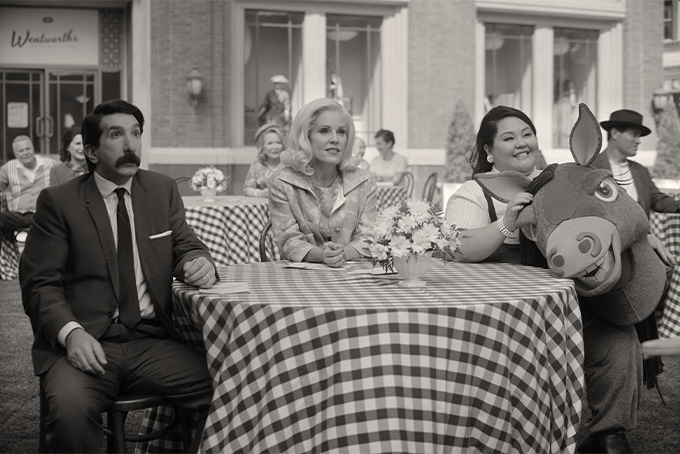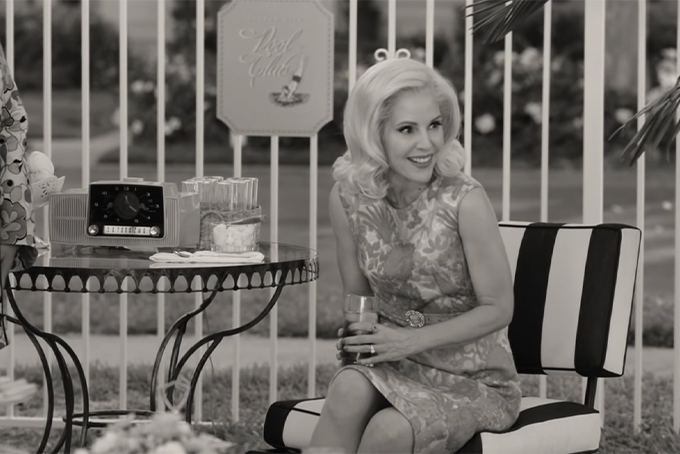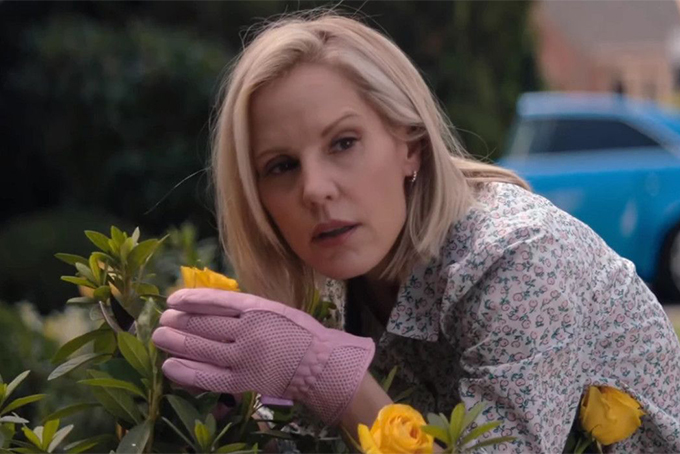WandaVision is weird. Marvel’s most iconic superhero couple, Wanda (Elizabeth Olsen) and Vision (Paul Bettany), live idyllically and blissfully in the suburbs—but something is very, very wrong. Maybe it’s that each episode finds them living out the tropes of a different decade’s sitcom. Maybe it’s the strange meta-commercials that interject between an episode’s acts, advertising Stark Industry toasters and Hydra Soak bath powder. Maybe it’s that pesky beekeeper; or worse, what he represents.
So far, WandaVision has little of that rock-’em-sock-’em action we’ve come to expect and adore from previous entries in the Marvel canon. Instead, the Big Bad, at least in the episodes that have been released so far, is grief.
WandaVision shouldn’t work. It probably shouldn’t be as magical as it is. But it’s weird, yes, and absolutely wonderful. That’s due to airtight writing, sparkling production design, and devastating performances from Olsen and Bettany—and their mysterious neighbours. The queen of whom, incidentally, happens to be Dottie Jones (Emma Caulfield, of Buffy the Vampire Slayer fame), an icy blonde who rules the ‘burbs with an iron fist.

To celebrate the island-wide release of Disney+ and its thousands of hours of content, Vogue Singapore sat down with Caulfield to find out more. Given WandaVision‘s penchant (no spoilers, we promise) for hidden agendas and big character reveals, we wanted to know: who exactly is Mrs. Jones? A disguised Dr. Strange? The witch Arcanna Jones? A terrifying extra-dimensional devil?
If she knows, Caulfield isn’t spilling. But she is happy to dish on plenty else. And it’s as Agnes tells Wanda in the show’s second episode: “Dottie is the key to everything in this town.” In a universe as painstakingly plotted as the Marvel one, that may as well be a giant, flashing neon sign. Other clues, however, are harder to come by, and will require a sharp eye and borderline-obsessive mind to detect. Scour this interview; see if you find any. And, whatever you do, don’t touch that dial.

A lot of viewers are pretty confused about what exactly is going on in the town of Westview, New Jersey. But there’s one thing that they seem to be certain about—that, despite only appearing in three episodes so far, you’re a fan favourite. Did you expect such a reaction?
No! I absolutely did not. I don’t even know how that’s possible. When I saw that online, I was completely bowled over. I was just like, “What? Whoa!” But it’s very cool. I’ll take it. And I’m very, very humbled and very appreciate of that.
What was it like to be invited to be a part of the Marvel universe?
Oh my God. I can’t even… What? That’s my general demeanour all the time, watching the show live with everybody else. It’s completely surreal. I never thought I would be a part of the Marvel universe. Never in a million years. I thought that that opportunity had passed me by. Like, it should have happened when I was 20, you know? And if it didn’t happen then, it’s not going to happen now. I had to keep telling myself: “Emma, you’re lucky. You’re fortunate enough to have been a part of other shows with huge fanbases. Don’t be greedy. Come on.”
How did it come about, then?
It just so happened that I worked with Jac Schaeffer [WandaVision‘s showrunner] on one of my favourite projects, TiMER, and she just happened to continue to kick ass and get involved with Marvel and want to work with me. We had been trying to work together for forever. And this was the one that fit. At the time, it was like: “I will absolutely work with you. I don’t care what it is. You want me to play a dead person? I’ll be in a coma the whole time! I’ll do anything you want!” Because she’s so good. I just wanted to work with Jac, and then along came Marvel.

How does working for Marvel compare to other projects?
It’s like stepping onto an alien planet, working for Marvel. Everything is just sequins and glitter and champagne and caviar. It’s like the world just opens up its pearly gates, and there’s just joy. Everyone’s going, “I’m on Mars. Are you? Me too, you know?” Super cool.
How has working on the show through the pandemic been?
We started shooting pre-pandemic in Atlanta, and then we broke for the holidays. The plan was to pick things back up in Los Angeles. But then COVID happened and everything shut down in February. And we didn’t know when we’d pick back up—TBD, you know. Months and months passed, and we got the call. I think we were one of the first productions to go back. So there was definitely a lot of additional pressure to make sure everything worked okay, because everyone wanted to finish it. Everyone was so excited to keep working on it and finish it, while staying safe. But once we got back into the swing of things, it was just like going to work on any other day. I’m just so fortunate to have been working during a time like this. I’m very blessed to have had a job to do.
Why do you think the format of the show—sort of meta-sitcoms through the decades—has resonated so much with audiences?
The clothes are great. The music’s great. Who wouldn’t want to revisit a time where everything was just glitter or disco? Where everyone’s all dressed up? Or when there was just that initial explosion of everything we take for granted now: hip-hop, rap, R&B, music videos. Jeans! We’ll always want to revisit those moments. It’s a natural pull. I didn’t grow up with the Beatles, but I know everything about them. I think when a movement pops up in the culture, it just gets passed down in our DNA, and we’re naturally fascinated by it.

A lot has been made of that possible Buffy Easter egg in the second episode, but we heard you didn’t catch it until viewers pointed it out. Is that true?
I never saw it. We shot it, and I never noticed it. It wasn’t on my radar at all. So when the fans started talking about it, I was really confused. “Why are they saying that Anya [Jenkins, Caulfield’s Buffy character] is back?” I still don’t quite understand it. It’s there, a little shout to the past, I suppose. I texted Jac today to ask, but she never mentioned to me that it was an intentional throwback. But it makes sense that it would be; why not?
What was the most challenging part of playing Dottie?
In those early episodes? Making sure I got the mid-Atlantic accent right. Making sure I didn’t go and slip into a British accent. [Putting on accent] You know, mid-Atlantic is very, very—you know. [Laughs] And then to not sound ridiculous. Accentuating everything while holding back. You do get into a groove, but it’s so foreign. Pretty fabulous, actually. It was kind of a bummer we had to move on from it. All of sudden you could understand what everybody was saying. It wasn’t “gonna,” it was “going to.” And then, only once I had the voice, then I could go and do all the internal work and figure out who Dottie is.
There does seem to be more to Dottie than meets the eye. We know Marvel guards its secrets jealously, but we have to try: can you tell us anything more about what exactly we’ll see from her in WandaVision?
I can’t say anything. [Dottie] is super fun and I’ve had so much fun playing her—and that’s all I can say. It’s so annoying, I know. I do feel for viewers. I’ve had to not say anything, basically since October, 2019. And at this point, I’m just used to not saying anything. You learn to say: “I don’t know. That’s a good theory. That’s good. That is interesting. Oh, I haven’t heard that one yet.” [Laughs] If I talk, Marvel will probably put a hit out on me. You’re just going to have to watch.
Subscribers can sign up on DisneyPlus.com or download the Disney+ app on Android and iOS devices from today. Start streaming Disney+ for S$11.98 a month or S$119.98 a year.





